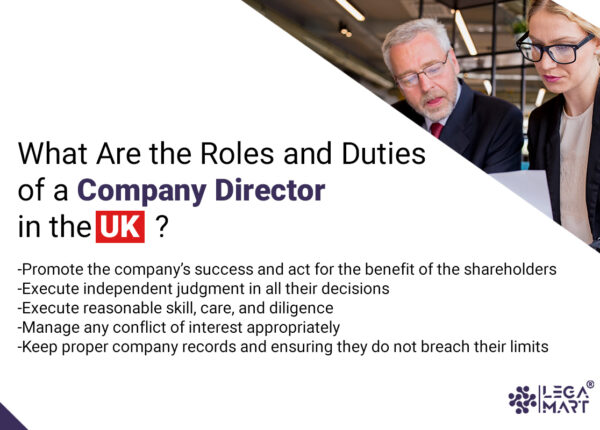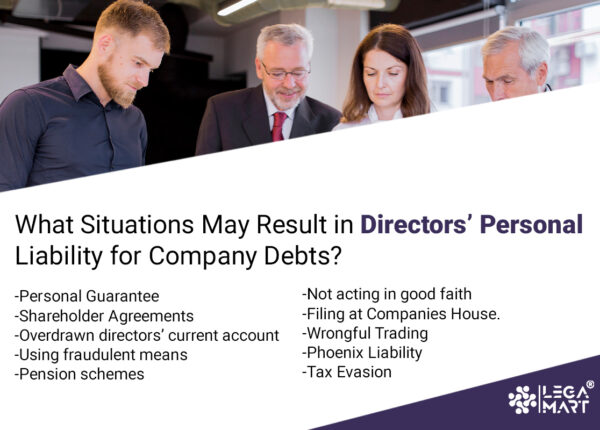- Introduction
- What are the roles and duties of a company director in the UK?
- Directors liability in the UK
- Personal liability
- Other Liabilities
- What situations may result in directors’ personal liability for company debts?
- When directors may get excused from the liability?
- Who can initiate proceedings against directors?
- How can directors be protected from liability?
- Insurance policy for directors
- Conclusion
Introduction
Directors are responsible for the management and decision-making of the company. They must do it in good faith and with due care. In the context of Cross-Border & International Law, directors act as agents of the company, trustees of the company’s assets, and employees of the company.
At LegaMart, we offer comprehensive international online legal services, connecting clients with experienced lawyers from around the world. Our global network of legal professionals is equipped to handle a wide range of legal matters across jurisdictions, including corporate law, cross-border transactions, immigration, intellectual property, dispute resolution, and more. By leveraging technology, LegaMart provides efficient, accessible, and high-quality legal support tailored to the unique needs of individuals, businesses, and organizations operating in an increasingly globalized environment. No matter where you are, our team is here to deliver reliable legal solutions across borders.
What are the roles and duties of a company director in the UK?

The roles and duties of a company director are extremely important, considering that the director plays a vital role in the management and strategic direction of the company. The major decisions for the company are taken mainly by the voting procedure conducted by the board of directors of a company. However, a possibility exists of having delegated powers involved in the process.
The Companies Act 2006 has codified most of the duties that the directors are expected to undertake. Other duties are included in the Articles of Association of the company, which further improvises on the directions and limits of a directors’ decision-making power. As has been provided in the Companies Act, the directors are expected to:
- Promote the company’s success and act for the benefit of the shareholders and the impact of their decisions on the company’s employees, communities, customers, and the environment.
- They are expected to execute independent judgment in all their decisions.
- They are expected to execute reasonable skill, care, and diligence.
- They are expected to manage any conflict of interest appropriately.
- They are responsible for keeping proper company records and ensuring they do not breach their limits.
Directors liability in the UK
Under the Companies Act 2006, various fiduciary duties have to be complied with by the director, such as:
- Comply with the constitution of the company and the powers allocated to him under that.
- Act in pursuance of the success of the company.
- Duties must be carried out with reasonable care, skill, and diligence.
- No benefits shall be taken by him from any third party.
- There should be no conflict of interest.
- Use independent judgment while making any decision for the company.
- If any interest of the director exists out of the proposed transaction, it must be declared by the director to the company.
In case of any breach of the above-mentioned fiduciary duties of the director, there can be civil action and a criminal sanction. So the director is under liability to comply with the fiduciary duties towards the company.
The Companies Act 2006 introduced a new liability regime for untrue or misleading statements in a company’s reports. The director will be liable to compensate the company for any loss due to any untrue or misleading statement.
If you are interested in investing in the UK, read the article below:
UK, Best Place to Expand Your Business
Personal liability
Personal liability means that the director is liable to pay for losses arising due to his acts in the company and might have to pay from his property to pay off the liability. Such conditions when a director is liable personally are as follows:
- Environment-related issues
- Health and safety issues
- Employment matters
- Consumer protection law breach
- Bribery/anti-corruption matters
Other Liabilities
There are several other liabilities also, that may arise due to the acts of the director, which are discussed below:
File Information at Companies House
The documents and updates related to the company have to be filed with the company house after a certain interval of time. The director is obligated to check if all the documents have been filed and ensure that these filings take place on time. The director is legally responsible for the accounts, records, and performance of the company.
The director can be held guilty if he doesn’t comply with the obligation and will have to pay a fine and maybe be prosecuted or disqualified. Thus, it is the legal liability of the director to comply with the responsibility.
Data Protection
There is legislation related to data protection, storage, disclosure, and destruction of personal data of the company, and the director must comply with the legislation imposed duties. You can also read our article about What Is a Non-Disclosure Agreement (NDA)?
Every company must have policies for data protection and its procedure. There are fines imposed on the company director in case there is any breach in the compliance of such legislation and policy.
The court can also hold the director personally liable for the non-compliance and impose criminal liability for the same because it harms the reputation of the company.
Health and Safety
Employees and others, such as contractors, visitors to their site, etc., get affected by the act of the director, and the director must maintain and comply with the health and safety regulations. This duty arises out of the Health and Safety Act.
If any act committed in the company harms the health and safety of the employee and others, it is presumed that it has happened due to negligence on the part of the director. Therefore, the company director has to face proceedings for breach of the relevant health and safety regulations. Penalty for this non-compliance ranges from fine to imprisonment for up to two years.
Under Section 37 of the Health and Safety at Work Act, 1974, it has to be proved that the offense has been committed by the company with the consent or connivance of the director of the company. If there is a fatal work-related incident, the director could face a charge of gross negligence manslaughter, for which punishment may extend to a term of life imprisonment.
What situations may result in directors’ personal liability for company debts?

There are many situations that may result in directors’ personal liability for company debts:
- Personal Guarantee. If a director provides a personal guarantee for any loan funding, it becomes the responsibility of the director and not the company to repay the loan.
- Shareholder Agreements. Apart from personal liability, some shareholder agreements can state that the directors shall provide security for company debts. This makes the directors personally liable for the company’s debts.
- Overdrawn directors’ current account. The directors often have the advantage of favorable tax rates on company dividends. However, if a company starts to struggle and the director continues to withdraw dividends, it causes an increase in the tax rates. Since the directors may continue to pay lesser tax rates, a situation of overdrawn current account may arise for the director.
- Using fraudulent means. In case the director is using inaccurate information or using any other fraudulent means to accumulate debts, it would result in the director becoming personally liable.
- Pension schemes. It may be possible for a director to become liable under section 75 of the Pensions Act 1995. This involves winding up the pension scheme, and they may be served with a contribution notice by the pension regulator.
- Not acting in good faith. As has been held in the case of Antuzis v DJ Houghton Catching Services Ltd, in case a director enters into a contract on behalf of the company in bad faith, the director can become personally liable.
- Filing at Companies House. The director can be fined up to £5,000, in case the company cannot fulfill its filing obligations within the period provided.
- Wrongful Trading. This situation has been covered under section 214 of the Insolvency Act 1986. If the director is aware that the company has no reasonable prospect of avoiding any insolvent liquidation or administration, and yet the director does not avoid taking steps to stop further potential loss to the company, it is possible for the courts to ask the director to make the accurate contributions against the additional damages incurred.
- Phoenix Liability. If a director re-uses the name of an insolvent company in a new venture, it becomes an offense against the director. In case a director wishes to go forward with this, the director is expected to have a court order, along with providing an accurate notice to all creditors of the company.
- Tax Evasion. This new form of liability had been introduced within the Finance Act 2020, wherein the HMRC can hold some directors jointly and severally liable in some insolvency circumstances. Situations like tax evasion, tax avoidance, and repeated insolvency can impose personal liability on the director.
When directors may get excused from the liability?
Directors can be excused from their liability on the ground that they director has acted in good faith of the company. It becomes the duty of the director to convince the court that he acted honestly and reasonably in all the circumstances. The director can also bring such a claim in court on his own.
Who can initiate proceedings against directors?
The following can initiate proceedings against directors:
- The company. The company itself has the right to sue the director and take legal action against him if there is any breach of the fiduciary duty of the director towards the company. The company generally initiates proceedings against a director on the demand of shareholders. Shareholders are the major stakeholders of the company, and any breach of duty on the part of the director affects the shareholders’ rights. Generally, the shareholder does not have the right to initiate proceedings against the director. Thus, the shareholder approaches the company, and the company initiates further proceedings. The shareholder generally demands action against the director to seek the restitution of financial loss or damage caused to them due to the action of the director.
- The shareholders. In cases of derivative claims, a shareholder can initiate the proceedings. The shareholder brings the claim in the name of the company claiming the loss of the company and not their own. This is how shareholders can indirectly initiate proceedings against directors. In such a claim, the court must be convinced that the proceeding was initiated by the shareholder in good faith.
- Other directors of the company. When there is a board of directors in a company, and a breach has been done by any of the directors, other directors may also initiate a claim against that one director. But such claims by the directors must also be made in the name of the company and to claim the loss of the company.
- Liquidator during Insolvency. If a company becomes insolvent and the director is found to be in breach of duty due to which such conditions have arisen, then the liquidator is under a duty to consider a claim against the director, and such claims are treated as an asset of the company. Such claims are pursued further and the benefits realized from them are used for the benefit of the creditors.
How can directors be protected from liability?

Directors can be protected from liability in various ways:
- Ratification. Directors may be protected from liability if the shareholders ratify the conduct of a director, in case the conduct is negligent or against the majority resolution (in exclusion of the votes of the director concerned or any of their connected persons). However, it is important to note that such ratification is not capable of absolving the director from any liability against a third party in the matter concerned.
- Indemnity. While exemption of liability is not possible by the company, it is still possible for the company to indemnify the directors against certain liabilities that have been incurred by third parties. Indemnity is capable of involving both the award of damages against a director and the costs of defending a claim. However, indemnity cannot absolve the director of regulatory fines or criminal proceedings. While it is possible for the company to pay defense costs for the director, however, such an amount is treated as a loan taken by the director, and the director is expected to repay the amount in case the defense is unsuccessful, and if the costs have not been covered by any permitted indemnity.
- Insurance. Insurance is quite common in the UK since it covers individual directors against any claims made against them in their capacity as a director.
If you are working as a director in UAE or as a director in Turkey, then make sure that you upgrading your knowledge on your liabilities and penalties in that country.
Insurance policy for directors
Under Section 233 of the Companies Act, a company is permitted to get its directors and directors of associated companies insured from the liability arising from their negligence, default, breach of duty, or breach of trust about the company they are associated with as a director.
Directors and officers insurance (D&O)
This insurance is taken by the company to ensure their directors if any liability arises in the future out of the duties they have discharged as a director. The claims can be made for negligence, breach of duty, or any other default on the part of the director.
The protection offered by the insurance companies includes the claims like claims by shareholders, official investigations, claims due to insolvency of the company, etc. But any fraudulent, dishonest, or criminal act of the director is not protected by the insurance policy of the company. A certain amount of consideration must be paid by the director against their potential liabilities.
These policies operate on a claim made, which means that the insurer is obliged to provide the cover when it is claimed by the insurance company. They are not under obligation to provide cover at the time the act of negligence or any other default was committed.
These policies are generally offered on an aggregate basis, meaning that all the claims made over a specific period will be covered under the policy from a single pot of money.
Specific director’s liability insurance
The company agrees to provide indemnity to the directors for the act committed by the director while managing the company. If a director makes any negligence while managing the company, the company takes the responsibility to indemnify the loss that occurred to the company due to such negligence.
It is taken only if the articles of the company allow it and not otherwise. So before getting this insurance, the director has to ensure that such insurance is allowed under his company’s article of association.
It is generally given by the company to provide peace of mind to the directors of the company. This reduces the need for D&O insurance. However, both specific director’s liability and D&O insurance can be taken to protect the balance sheet of the company.
Conclusion
Thus, a new statutory procedure for claims against directors has been introduced, and directors are provided with wider indemnity, as compared to earlier, to provide the directors some peace of mind while taking actions and decisions while working in the interest of the company.
Any form of personal liability can only be imposed on the company if it is proved that the director has acted in bad faith of the company and extreme misconduct and negligence exist.




